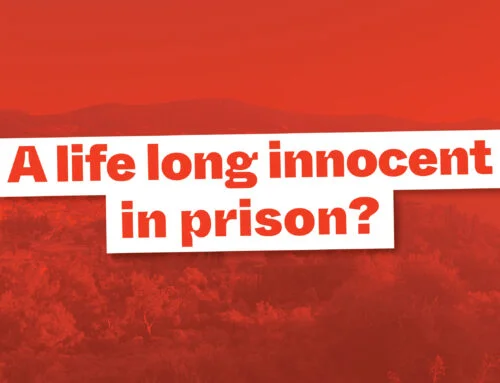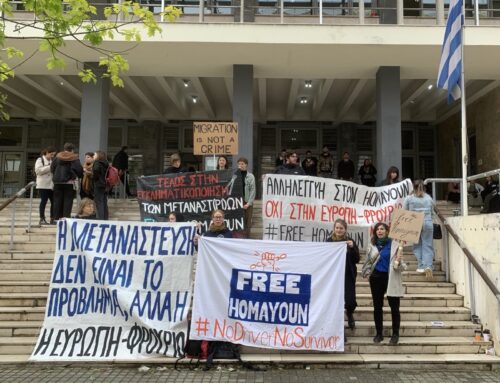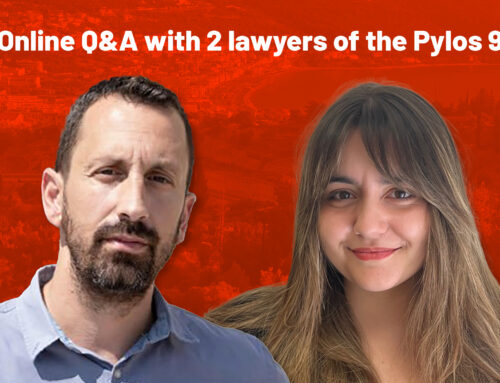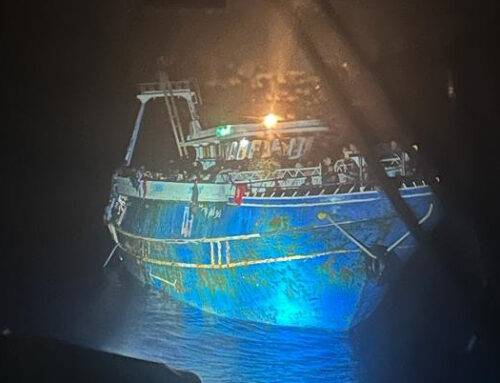SAMOS – Human Abysses in the Shadow of the World’s Public: The “Prison Camp” in Zero
April 11, 2024
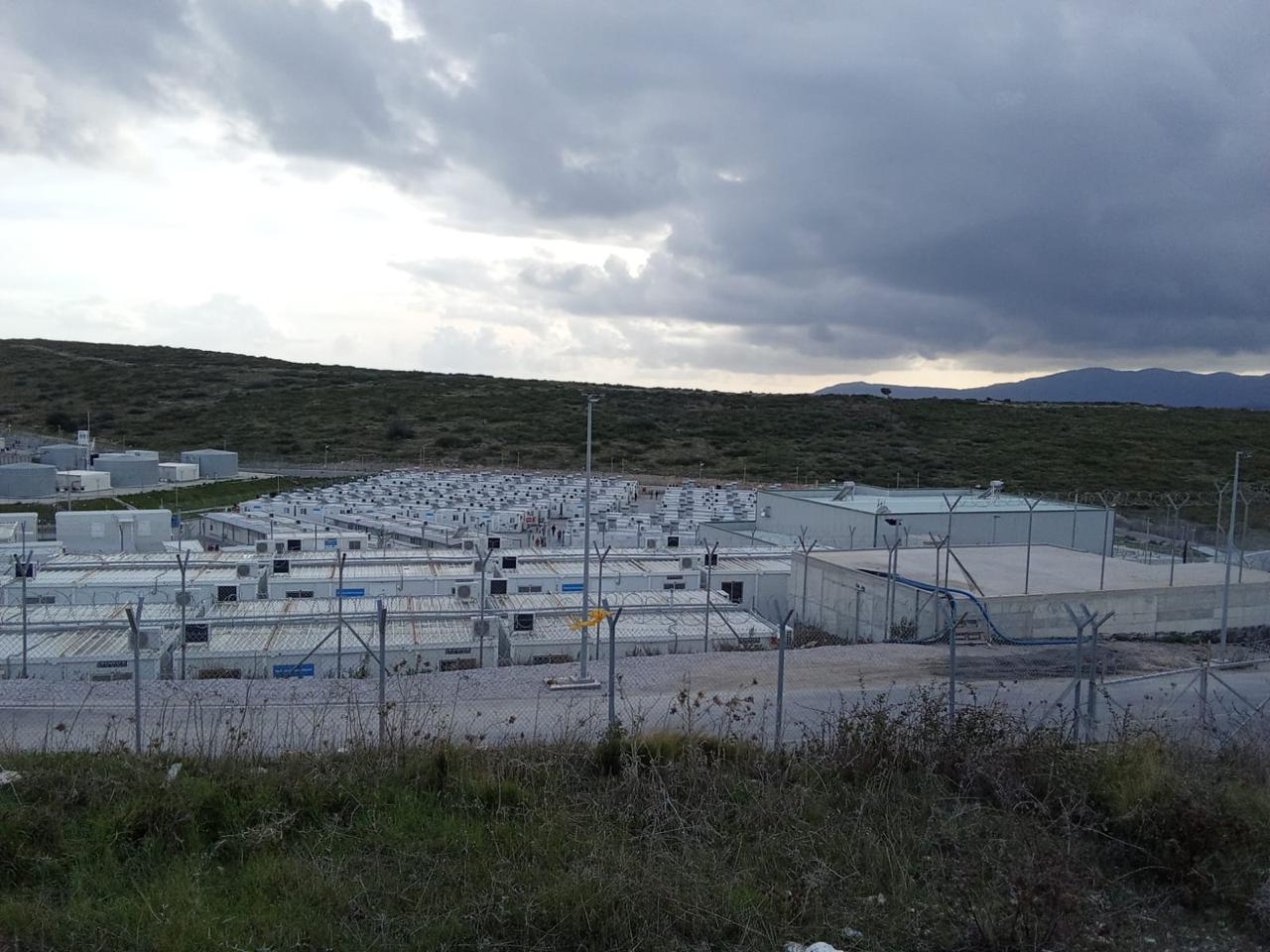
On 10 April 2024, the EU Parliament adopted the reform of the Common European Asylum System (CEAS) – a dark day for Europe and human rights. However, parts of what the reform will soon bring have long been a bitter reality. For example, the “prison camp” for arriving refugees on the Greek island of Samos.
“The boat drifted with morbid inertia and the sun grew brighter in the cloudless sky. Suddenly the engine began to splutter. Actually, it was no surprise that we ran out of petrol, but we had hoped it wouldn’t happen.” (Imad Al Suliman, “The Jasmine Inferno”, p. 28)
In his book “The Jasmine Inferno – An Escape Story”, author and human rights activist Imad Al Suliman tells the story of Fouad, a Syrian refugee who arrives on the Greek island of Samos after a near-fatal crossing of the Mediterranean in a rubber dinghy. Imad describes his own escape from Syria to Europe in 2015 from the perspective of the fictional character Fouad. Imad himself experienced the near-death experiences and existential crises recounted in the book. First at sea, then immediately after arriving on the narrow uninhabited coastal strip of Samos and finally under the conditions in the reception centre in Vathy. Today, it is important to him to share his experiences from back then, but also his views on current European migration policy.
How has the situation on Samos developed since then?
Imad arrived in Germany in July 2015. A lot has happened on Samos in the eight years since he travelled there by rubber dinghy.
“Even when I was a refugee in the camp on Samos, we were treated like prison inmates,” says Imad. “The way we were housed behind walls, guarded by soldiers and channelled through the corridors in queues for food left little room for interpretation.”
At its peak, up to 8,000 people lived in the Vathy camp, but it was only designed for just about 650. A further camp gradually formed in informal rows of tents around the actual sealed-off camp, which became known colloquially as the “jungle”. The conditions became increasingly unsustainable, supplies were insufficient and Samos became the hotspot of a humanitarian disaster.
The Vathy Camp was evacuated and closed in 2021. Instead, the Zervou Camp was opened in the remote interior of Samos. In keeping with the motto out of sight out of mind, the EU’s first “Closed and Controlled Access Camp” (CCAC) celebrated its premiere.
What’s new at the CCAC?
The name says it all – the initial reception centre should be open to as few outsiders as possible, including the media, humanitarian aid workers and critical observers.
New restrictions for humanitarian organisations make access to the camp difficult and almost impossible. Medical and healthcare aid initiatives have only been able to continue their work in the new camp in Zervou to a limited extent, if at all. The authorities are also focussing on isolation: far away from towns and villages, there is only one bus that travels past the camp to places with shopping facilities. But the bus costs money, 4 euros per ticket.
At the same time, the food served in the camp is largely inedible and is already bad when it is distributed.
The camp officially has space for 3,650 people. However, it has been overcrowded since September last year, causing humanitarian standards to fall even further.
This new camp, which is regarded as a major pioneer for the regulated reception of refugees at the EU’s external borders, disregards all fundamental rights standards and is run in the shadow of the world public under inhumane conditions.
What can we do about it?
For many years now, there have been amazing organisations on Samos that enable people from the camp to have a more pleasant and dignified stay on the island. For example, the Just Action Samos team. In their Free Market, the helpers distribute food parcels to the people from the camp, paying attention to sustainability and quality.
For many people who are stuck on the island with no possessions, no income and no certainty about their future, Just Action is a source of security and support. In addition to food, Just Action also provides bus tickets to refugees.
“For many who are stuck behind barbed wire and high walls for months on end, the limited access to towns and villages is a further mental and logistical burden,” Lene, founder and director of Just Action Samos, tells us.
The localised separation of the “prison camp” from the rest of the touristy Mediterranean island is intentional on the part of the Greek government.
“We are therefore also politically challenging this systematic injustice by regularly handing out bus tickets,” explains Lene, “we are countering the growing marginalisation with all the means we have.”
We at LeaveNoOneBehind hope that the incredible team at Just Action can continue their work for a long time to come! You too can support the organisation with a small donation. Even small amounts make a big difference on the ground!
Do you want to join us in the fight against human rights violations and make projects at the external borders possible? Then become an LNOB supporting member now!
Related News
We become active where states fail to act. But only with your support!
With our work we put pressure on German politics to take responsibility and finally change something! Your donations will be used for the #LeaveNoOneBehind campaign: For our own projects, as well as for funded projects and organizations that provide urgently needed support at the EU’s external borders and refugee routes.

